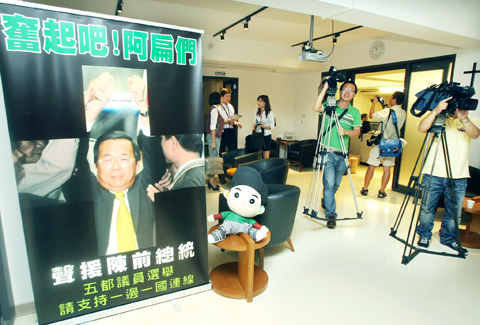The office of former president Chen Shui-bian (陳水扁) yesterday announced belt-tightening measures and asked for public donations to sustain its daily operations until February after a recent amendment revoked Chen’s perks as a former head of state.
Chen Sung-shan (陳淞山), manager of Chen’s office, said it would continue to operate despite the financial difficulty. To sustain the NT$540,000 (US$16,800) monthly expenses, he said the office would implement austerity measures to cut costs.
The five office employees have agreed to a salary cut of 20 percent and the Neo Formosa Weekly magazine will become a biweekly publication, he said.

PHOTO: CNA
BOOK REVENUE
They also hoped to raise some money when the office launches a book written by the former president.
Chen Sung-shan urged the public to make donations of small amounts, saying they hoped to raise NT$4 million to finance daily operations until February. If things did not go well, he said he was willing to borrow money with his own credit.
Since the “one country on each side of the Taiwan Strait alliance” has 35 members standing in the November elections, Chen Sung-shan said he was confident that between 80 percent and 90 percent of them would be elected and then they could address the funding problem.
The legislature on Aug. 19 passed an amendment to the Act Governing Preferential Treatment for Retired Presidents and Vice Presidents (卸任總統副總統禮遇條例) introduced by the KMT caucus.
The amendment stipulates that former presidents and vice presidents will be stripped of courtesy treatment, including their monthly allowance and annual expenses, if convicted by a court of grave offenses, such as sedition or graft.

The manufacture of the remaining 28 M1A2T Abrams tanks Taiwan purchased from the US has recently been completed, and they are expected to be delivered within the next one to two months, a source said yesterday. The Ministry of National Defense is arranging cargo ships to transport the tanks to Taiwan as soon as possible, said the source, who is familiar with the matter. The estimated arrival time ranges from late this month to early next month, the source said. The 28 Abrams tanks make up the third and final batch of a total of 108 tanks, valued at about NT$40.5 billion

A group from the Taiwanese Designers in Australia association yesterday represented Taiwan at the Midsumma Pride March in Melbourne. The march, held in the St. Kilda suburb, is the city’s largest LGBTQIA+ parade and the flagship event of the annual Midsumma Festival. It attracted more than 45,000 spectators who supported the 400 groups and 10,000 marchers that participated this year, the association said. Taiwanese Designers said they organized a team to march for Taiwan this year, joining politicians, government agencies, professionals and community organizations in showing support for LGBTQIA+ people and diverse communities. As the first country in Asia to legalize same-sex

MOTIVES QUESTIONED The PLA considers Xi’s policies toward Taiwan to be driven by personal considerations rather than military assessment, the Epoch Times reports Chinese President Xi Jinping’s (習近平) latest purge of the Chinese People’s Liberation Army (PLA) leadership might have been prompted by the military’s opposition to plans of invading Taiwan, the Epoch Times said. The Chinese military opposes waging war against Taiwan by a large consensus, putting it at odds with Xi’s vision, the Falun Gong-affiliated daily said in a report on Thursday, citing anonymous sources with insight into the PLA’s inner workings. The opposition is not the opinion of a few generals, but a widely shared view among the PLA cadre, the Epoch Times cited them as saying. “Chinese forces know full well that

Travel agencies in Taiwan are working to secure alternative flights for travelers bound for New Zealand for the Lunar New Year holiday, as Air New Zealand workers are set to strike next week. The airline said that it has confirmed that the planned industrial action by its international wide-body cabin crew would go ahead on Thursday and Friday next week. While the Auckland-based carrier pledged to take reasonable measures to mitigate the impact of the workers’ strike, an Air New Zealand flight arriving at Taipei from Auckland on Thursday and another flight departing from Taipei for Auckland on Saturday would have to